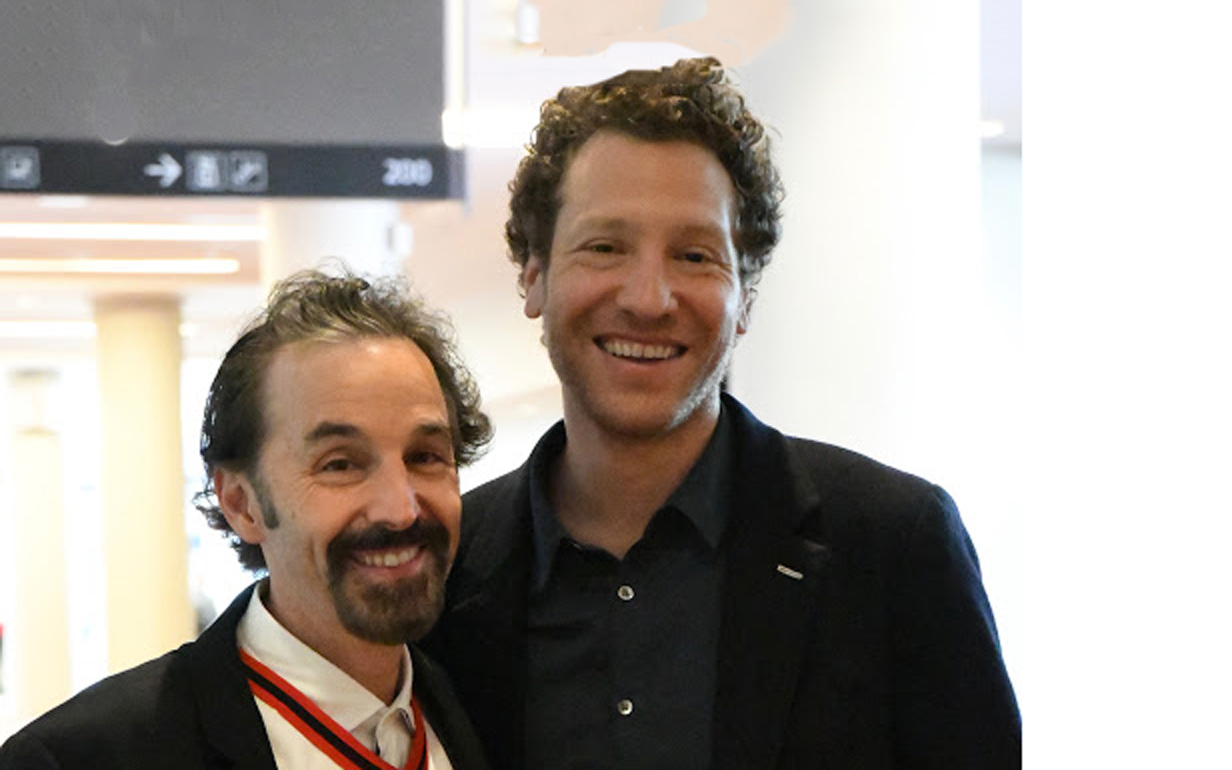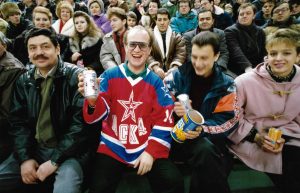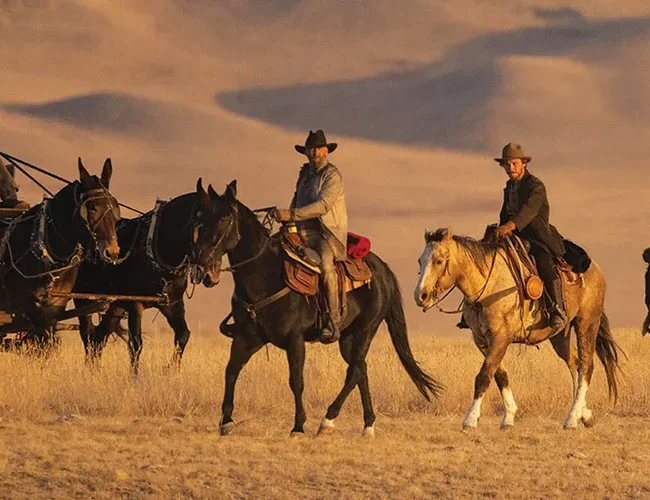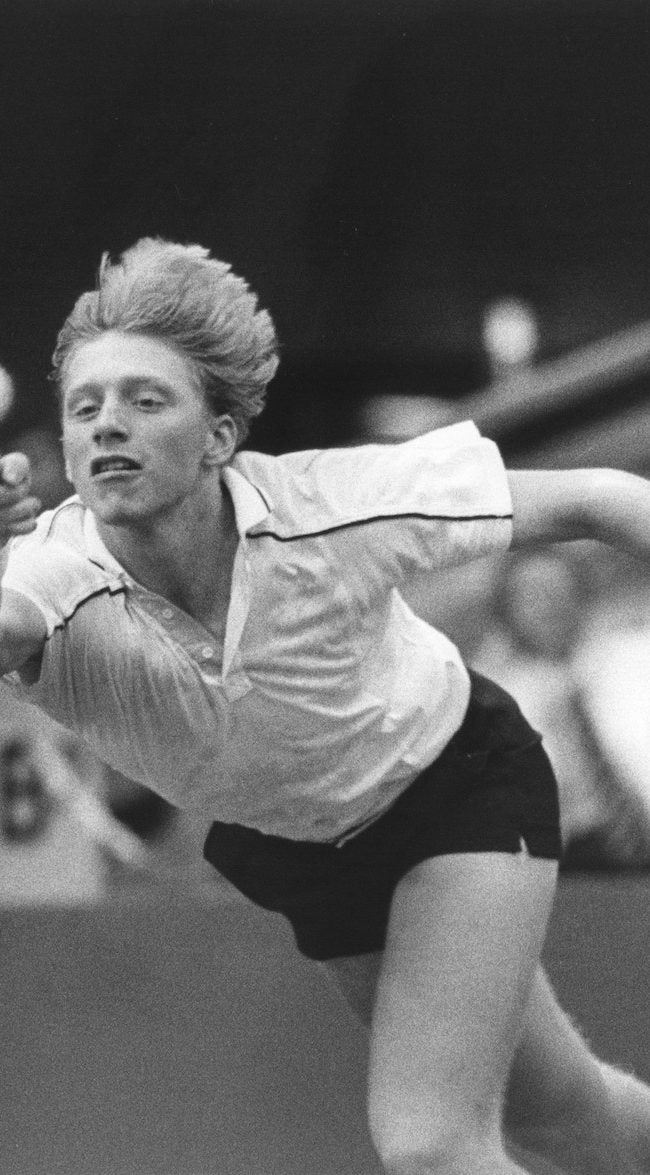A Conversation with Steven Warshaw & Gabe Polsky (RED PENGUINS)

Director Gabe Polsky is back at it, following up on his 2014 Red Army, about the successful Soviet hockey team, with Red Penguins (which I reviewed for Hammer to Nail), about what happened to the organization once the Cold War ended. It just so happens that I have a robust background in the history of that era, as I studied Russian language, history and literature in my undergraduate program, graduating just as things were falling part in the USSR, and then continued my studies in graduate school as that massive empire fractured and became multiple sovereign nations. This was years before I would abandon that particular path for film school. I therefore found myself traveling frequently, first to the Soviet Union and then to just Russia, from 1988 to 1998, when I took my last trip (I have not been back since). And so I found this new documentary by Polsky particularly engaging, as I knew the environment well.
The film tells the story of how the owners of the Pittsburgh Penguins, Tom Ruta and Howard Baldwin, decided to fund a venture to revive the ailing fortunes of the Red Army team, sending a young marketing executive, Steven Warshaw, to set up deal after deal. That he emerged alive, despite the omnipresence of organized crime in most businesses, is a miracle. Along the way, he had a pretty good time, too. Warshaw joined Polsky and me for a virtual chat recently, where we discussed his experiences both at that time and in the making of this documentary. After sharing my own personal connections to Russia, we began our conversation. Here is a condensed digest of that discussion, edited for length and clarity.
Hammer to Nail: I’m so excited to be talking to the both of you. As I explained, this film is of particular interest to me because of my own traveling to Russia in the 1990’s. Unfortunately, my last trip was in 1998, so I do not at all know the Russia of Vladimir Putin, but I do very much know the Russia of Boris Yeltsin, which was a crazy, crazy place. Gabe, could you tell me about your own background vis-à-vis Russia?
Gabe Polsky: Yeah, my parents were from Soviet Ukraine. They came in 1976 to Ann Arbor, Michigan, or Detroit, and I was born in 1979. My brother was born first and so I’m basically first generation. So, for me, my first language was Russian, for the first few years. And then I kind of quickly started to lose it, and lose it more. So, I kind of saw the culture in the house, and kind of saw how it interacted with American culture, and always sort of saw those two big, big differences in cultures and ways of thinking.
HtN: This film, to me, feels very much like a sequel to your 2014 Red Army. Did you already know when you were making that earlier film that you would want to continue the story into the ’90s? At what point did you start working on this film?
GP: Steve [Warshaw] calls it the un-sequel sequel. Basically, he came up to me after a screening of Red Army in New York. I didn’t know about his story. It was a screening for the New York Rangers and their front office. And Steve came up to me after the screening and said, “This was a really beautiful film, but I’ve got the beast.” He was talking about the story of the Russian Penguins and Steve’s time over there. And I didn’t really allow him to tell the story because I was not really interested in it because the idea of doing Russia again and hockey just sounded like I was going to be pigeonholed, and not something I wanted to do again right away.
Steve eventually sent me materials and I got to it after a long time of reluctance. Obviously people were going to think this was a sequel, but I never really wanted to think of it that way because I don’t like the idea of making sequels and stuff, and I felt that it could stand alone and was just a tremendous story and crazy world that no one’s ever seen or really been into in an interesting way, where I could have opportunities to flex comedic muscles and just tell an outrageous story with outrageous characters. And so I felt like it was a totally different opportunity, tonally very different from what Red Army was, and that I could kind of explore a different thing.
HtN: So, Steve, how did you pitch this to Gabe?
Steven Warshaw: Well, I was fortunate enough to be at the screening of Red Army and I literally made a beeline for Gabe at the post party because I felt that Red Army was the highlight and essence of Russian hockey. It was grandeur, it was beauty. And the Russian Penguins were the ugly side of what happened after the collapse of the Soviet Union and all the funding stopped for this famous team that had won more championships than the Montreal Canadiens and the New York Yankees. And so I realized that I wanted to meet Gabe and see if he had any interest in looking at what happened after the beauty. And we spent a few years discussing the best ways to attack this and then Gabe put together a beautiful cast of characters that really brought this story together.
HtN: What made you want to go to Russia in the 1990’s in the first place?
SW: Well, Pittsburgh was looking for someone that understood the culture, had worked with Russian hockey players, and I was fortunate enough to have done the marketing and endorsements for a lot of the Red Army stars, like Alexander Mogilny, Vladimir Malakhov and Valeri Kamensky, some of the top stars. So, when Pittsburgh was looking for this candidate, I had already had a background of running minor league baseball, basketball, and hockey teams in the States. I had a little bit of understanding of the Russian culture, a little bit of language – I guess I call it “hockey-room” or “locker-room” Russian, would be the best way to describe it – and they were looking for a guy that had no family, no kids, nothing to lose, and if they didn’t come back, so be it. And so I was selected.

HtN: (laughs) Well, I’m certainly glad you came back and I’m glad you’re in the film! So, Gabe, what difficulties, if any, did you face in researching for this film and finding additional subjects to interview? I’m assuming a lot of it was in place because of Red Army, and then you had Steve, but were there any other issues?
GP: I think making a great film is just very difficult, in general, and I kind of felt that, although the stuff that happened with the team was very interesting and strange, I wanted to tell a bigger story. And so, because I couldn’t get some of the characters like Viktor Tikhonov and, I don’t know, a few others, I wanted to kind of open it up and understand what was going on in the country and get into that world. And so, casting those other characters was very obviously important, for the intrigue and for making it more sophisticated and all that. And then obviously, getting them, and getting them to talk and open up and be themselves, and capture the soul of them, which would get me into the soul of Russia and the people, the mentality, the psychology, was another thing.
One thing is just getting the characters and then getting great interviews, then getting great archival, and figuring out how to weave the story together. It’s a process like writing a book. You just keep working, working, and brainstorming and making it better and using music. I mean, I don’t know, it’s all challenging, very challenging. Finding the right music, the right tone and pace. I mean, all of that stuff is kind of hard and challenging.
HtN: There’s a moment in the middle of an interview with a former KGB guy when the police show up. What was that about?
GP: It was towards the end of the interview and he was starting to kind of really go after current Russia, what was going on there and why, and sort of giving his thoughts. It was pretty intense. And I was kind of surprised that he was even saying all that stuff. But we were shooting kind of near Red Square and, I don’t know, it’s very public, and so basically, I started to notice that somebody was standing behind us, the small crew of three people, and someone was just lingering, this kind of overweight man, and just listening for awhile. Finally, I kind of stopped the interview and said, “Who is this guy? What is he doing?” It just was awkward. And as soon as I said that, five cops show up and tell us that we’ve got to get out of there because there’s a bomb in the area. And so that was the end of the interview. It was just very awkward and we all ran away from where we were shooting. That’s what happened. I don’t know. I don’t know what, why or what. It was just weird.
HtN: So, I recently interviewed Alex Gibney after he made his film Citizen K, and he talked about having burner computers and burner phones just because he knew pretty much that whatever he showed up with, technology-wise, would be bugged, or would be somehow broken into. Did you have any of those concerns, as well?
GP: I guess, yeah. I mean, I guess you just have to assume that you’re going to be bugged and stuff. I mean, if you look on the internet, everybody says that.
HtN: There’s a lot in this film about what started to go wrong with the Russian Penguins, as the mafia and other so-called “biznesmeni” became involved. Of course, “biznesmeni” is just another term for organized crime, no matter their pretensions to legitimacy. Steve, were there ever any moments – I mean, in the film, we can sort of sense the danger – but were there ever any moments in the ’90s when your younger self was conscious of being in real danger?
SW: Yeah, I mean it’s funny, your name, Chris, is close to “krysha,” which is “roof” in Russian. And that’s the name they use for the mafia. And every business had a roof. And if you didn’t have a roof, you were in trouble. And we thought that our roof was the army, that the army was going to protect us, but the army was no match for the mafia. Remember, the army had lost all of its funding. And that’s the reason that we were in Moscow, was to rescue this franchise. But all of their best players had left to play in the NHL. So even though there wasn’t money yet, they were watching us.
And then, as soon as we started getting successful, that’s when the sawed-off shotguns started coming into the arena. There was no such thing as metal detectors back then. And we knew we had a problem, though it was a good problem to have. All the rich Russians started coming up to the games and commandeering the suites, which was very awkward to tell your sponsors that you couldn’t stay in your own suite that night. And you see in the film one of the hits that took place on our assistant coach was a mistake by the same mafia group. So yeah, I knew it was a problem. Guys were always getting beaten up and threatened and yeah, I mean, we thought that the army was going to protect us. And that’s one of the elements of the film, that the army was not there to protect us.

A Still from RED PENGUINS
HtN: Yeah. That was, indeed, a really interesting story element. In the ’90s, I only ever had minor tangential brushes with “biznesmeni,” but you were much more in the thick of that entrepreneurial world, so I can only imagine. What do you think this story can tell us, Steve, about the Russia of today, about Putin’s Russia? I mean, yes, we have to look at the larger historical context, but so much of where we are today still flows from this virtually lawless period in the ’90s. What do you think, having lived that, this tells us about the current state of the country?
SW: Well, it’s interesting. You mentioned Alex Gibney’s Citizen K, and the storyline is that the oligarchs who had positioned Yeltsin where they wanted him, and he was their useful idiot, then selected Vladimir Putin, who they thought was going to be controllable. And just like Frankenstein’s monster, they created Vladimir Vladimirovich Putin, who is now the authoritarian figure, and now the oligarchs can’t control him. So, I’m not surprised to see it happen, having lived in Moscow during the “Wild East” – we call it the “Wild East” or the “Go-Go Nineties” – and really one of the interesting parts of this story is that we talk about a window of opportunity between the nations, where we could have cured a lot of the ills and stopped a lot of the Cold War. I went up to Jeffrey Sachs, the professor at Columbia University, one of the great minds about Russia’s economy, and I asked him this very question. I said, “If Bill Clinton had paid more attention to Boris Yeltsin than Monica Lewinsky, would the world be a different place?” And he said, “Absolutely. It was our missed opportunity as a country.”
And we were really just this little teeny hockey team that was the canary in the coal mine back then, and everybody was watching us, and we were successful. And that’s when the mafia came in. The same with Coca Cola, same with all of our sponsors. As soon as you got successful, they would change the deals. You’d go from 50/50 partnerships to 10/90 partnerships. And you remember what Putin did? He gave Deutsche Bank and Chase Bank a chance to get two cents on the dollar, about 10 years ago. Deutsche Bank took the two cents, Chase passed, and the next day went down to one cent on the dollar. So all bets are off in Russia, and I’m not surprised to see where Russia is today, based on what I saw 25 years ago.
HtN: Gabe, in structuring this film, how much were you thinking about creating something beyond the specificity of this story that could speak to our moment, because I think your film does very much speak to today’s Russia, even though you seemingly do it indirectly. How much, as the director of this film, were you thinking of that in your process?
GP: I’m not a big guy on trying to get the zeitgeist into my movies. However, you always want your film to be relevant. And I think that if you make films that are about human nature and the universal experience, they’re always going to be relevant, but still, it’s very hard to sell your film now if you don’t overtly show how relevant it is. You know what I’m saying? And I think with my film, you see, with the transition of power to Putin, you also see the Russian businessmen saying, “Well, thanks! You want democracy? Yeah, we’ll give you democracy, but it’s our democracy.” Basically, this film shows you the period in the ’90s which led to the rise of Putin and what he was all about, authoritarianism, and “rule of law,” and sort of why that was needed because of the chaos of that era.
But I think more so than that, even, is it gives people an understanding of this mentality and psychology in Russian culture that pervades, and I can’t even describe it really. It’s more kind of like witnessing the story, feeling it, feeling how these guys talk, how they behave, and by doing so, you start to absorb that. You know what I’m saying? And by understanding that behavior and culture, it just gives you a better sense of it and also allows you to communicate with it better, rather than sort of just all those press and media highlights of hacking. I mean, all that stuff is just like words and nonsense. But when you experience a story like this and you’re taken into the world, I think you better understand it.
HtN: Steve, I just want to tell you that I agree a hundred percent, looking back at this footage of American political leaders and the way they interacted with Yeltsin and others. I lived it and it makes me so angry, looking back at their naïveté at what was happening.
SW: It’s sad, because if you look at post-World War II, we took our two biggest enemies, Japan and Germany, and built them up when they were down after we destroyed them. And Russia was really in the same place. Fifty years later, here was a chance for the United States to play the role of savior and to help them. But we really turned our back on Russia. The National Hockey League stole all their players, and didn’t give them a dime back for their talent. The United States government really let this window of opportunity close. Capitalism was a new language in the new Russia.
And no one spoke the language except the oligarchs, which is why they waltzed away with most of the country before anyone could figure out what happened. And so we were there right at that window. And if we had really made serious efforts on a global effort to help rebuild Russia, we would not be the odd man out today with China and Russia. And we are the odd man out. And this hockey team sort of was, again, the canary in the coal mine. If we had only realized the potential of this little team, like Nixon used ping pong diplomacy in China, perhaps things would be different. But missed opportunities in life will cost you. And here we are.
HtN: And here we are. Thank you both for chatting with me. This was great. And I really, really enjoyed the film.
GP: Awesome. Thanks for everything. And that’s really cool how involved you were and what you know, and it’s kind of cool to just see someone with your experience give that feedback.
– Christopher Llewellyn Reed (@ChrisReedFilm)











